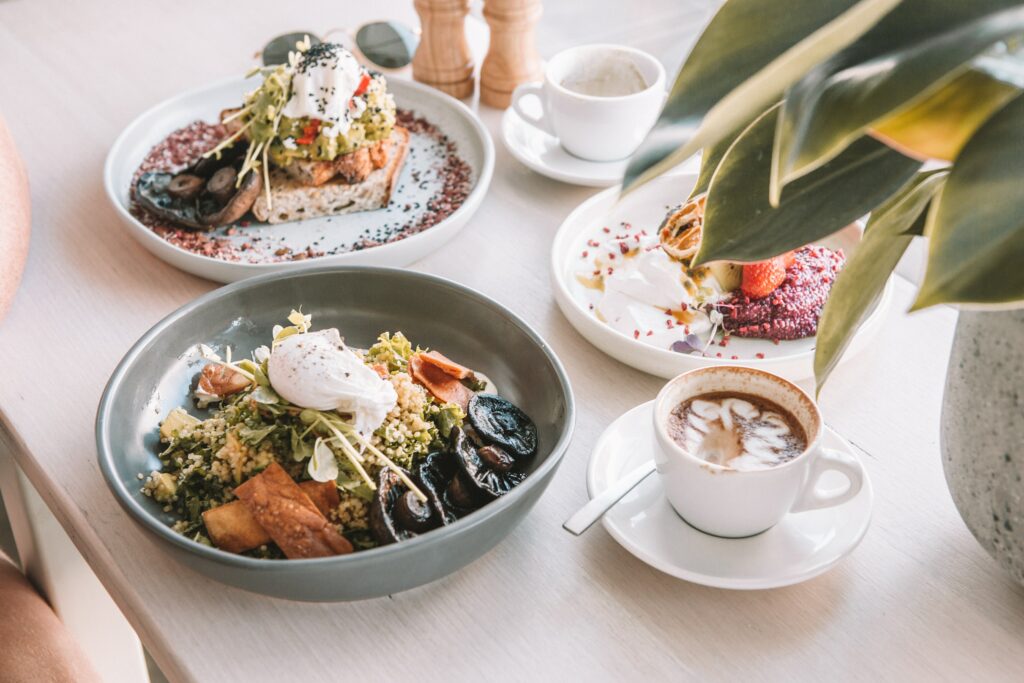
If you have IBS, you may be worried about eating out again in restaurants, bars or pubs. Having uncontrolled IBS can have a huge impact on your social life, and you might not share the joy so many other people feel at the prospect of eating out again after lockdown. So many of my new IBS clients actually said they enjoyed lockdown, because the pressure of having to eat out was removed. But eating out doesn’t have to be the stressful event you thought it was – especially with a little bit of advanced planning. In this blog post, my new clinic Associate Gurjit Dhanjal shares her top tips for eating out with IBS.
So what is IBS? And why is eating out potentially tricky?
IBS is a common digestive condition, often unpredictable and difficult to manage, especially if you’re not sure what your triggers are. It affects nearly 1 in 5 of the UK population, with women twice as likely to develop IBS than men.
Symptoms vary from one person to another and can include stomach pain, cramps, bloating, diarrhoea and constipation.
When it comes to eating out, the good news is that more and more restaurants are accommodating people with food restrictions and sensitivities, so once you have an idea of what may trigger your symptoms, you can do a bit of advanced planning and research your local restaurants before making dining plans.
There are many triggers for IBS, and they are not just food related. So here are some things to consider when you’re eating out to protect your gut:
Chew food really well – up to 30 times a mouthful!
Drink your food, chew your water – sounds back to front right? But chewing your food is just as important as making good food choices. The entire digestive process starts in your mouth, with chewing. When you chew your food properly, you’re stimulating the release of digestive enzymes, which are key to helping your body break down food properly and absorb nutrients. Not chewing properly and gulping down food has the potential to bring on digestive symptoms such as bloating, indigestion, flatulence, heartburn and cramps.
TIP: Slow down, take your time and try to chew each mouthful of food about 30 times, or until food has liquefied. Imagine you’re in a French cafe and have several hours to enjoy your lunch… put your knife and fork down, take smaller bites, chat to your friends or family for a while and really make your food last. Your food should be so well chewed, you wouldn’t recognise it just before you swallowed. Over time practiced enough it will eventually become a habit – and it can make such a difference to IBS sufferers, something we see so regularly in The Family Nutrition Expert clinic.
Reduce gluten and dairy
Eating a healthy diet means eating a wide variety of nutritious foods. However, people with IBS may notice that certain foods, such as gluten and dairy, trigger uncomfortable digestive symptoms. Many people with IBS will notice that avoiding or reducing gluten and dairy results in more regular bowel movements, fewer cramps and less bloating.
Gluten TIP: Gluten is a type of protein found in certain grains – including rye, wheat and barley. Gluten can be difficult to digest for some people, but there are so many delicious alternatives to enjoy. These include quinoa, sorghum, oats, chickpea, buckwheat, almond flour and coconut flour. If you love pizza, ask for gluten free options like ‘socca pizza’ – it’s a softer dough made from chickpea flour which will definitely cure any pizza cravings you may have!
Dairy TIP: Some people react to the lactose in dairy products, others react to the proteins (casein or whey). Common dairy intolerance or sensitivity symptoms include diarrhoea, bloating and wind. You can reduce or eliminate dairy by choosing vegan plant based milks like oat milk or almond milk. Go for tomato-based sauces rather than cream-based ones, and focus on freshly cooked dishes of fish and meat combined with rice or sweet potato, salad or vegetables.
If you’re trying to avoid dairy, a vegan dish might be helpful, but do bear in mind some people with IBS struggle with lots of beans and pulses. Instead choose a tofu based dish, or something made with quinoa for protein.

Pass on Ultra-Processed foods
Processed foods tend to contain a lot of added salt, sugar and fat and go through multiple levels of processing. Eating too much ultra-processed foods can lead to health problems for anyone, and not just for people with IBS!
Sugar, sweeteners, refined and processed foods lack natural fibre and inadequate hydration and may be responsible for many IBS symptoms. Food additives, like emulsifiers, colours and preservatives are prone to cause hypersensitivity reactions in some IBS patients. Even if you know which ones act as triggers for your symptoms, they are often hidden in processed foods.
If you have IBS and want to eat out, go for restaurants that pride themselves on choosing fresh, unprocessed and real food ingredients.
When you’re eating at home, start getting savvy with food labels to minimise the risk of having IBS flare-ups. Ingredients are listed in order from those with the highest content, to those with the least. Avoid where possible foods that lists more than 5 ingredients – the longer the list, the more processed it is. Ingredients to watch out for are dextrose, maltose, trans fats and hydrogenated oil, plus a long list of E numbers.
Stress: the gut-brain connection
Let’s face it… we’ve all been living in unprecedented times during the COVID-19 pandemic, and for many people the stress levels have been at an all-time high. Most people with IBS find their symptoms worsen during increased stress and this is because the brain directly effects the digestive system.
The gut has the highest concentration of nerves outside the brain and is often referred to as the “second brain.” In fact, we have a direct connection between our gut and our brain, via the vagus nerve, so it’s no surprise that stress can negatively affect our gut so much. “Butterflies in your stomach” is a real phenomenon, caused by this gut brain connection during stress.
When we are stressed, the body focuses on our imminent survival, as it perceives stress in the same way our cave people ancestors did. It doesn’t realise we’re no longer fighting for our lives, just fighting to get a deadline done or juggle a million plates. The priority at this time is not on breaking down food for energy.
Studies show that diaphragmatic breathing, or deep breathing, can greatly calm down the nervous system and improve IBS symptoms. You can find out more information on Catherine’s video here.
Getting to the Root Causes of IBS
If you have IBS or any other kind of digestive issue, then do get in touch as we’d love to hear from you. At The Family Nutrition Expert clinic, we can help you to explore the underlying drivers of your symptoms – from food sensitivities to microbiome imbalances, with a range of functional testing tools to help you learn more about what’s going on in your gut. We’d love to help you discover more about your digestive systems, and find a way of eating and a nutritional strategy to help provide you with long term relief. You can find out more about one to one consultations here.